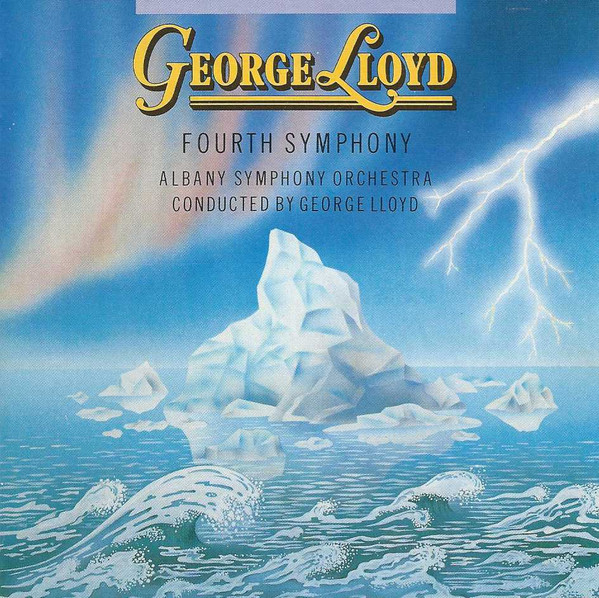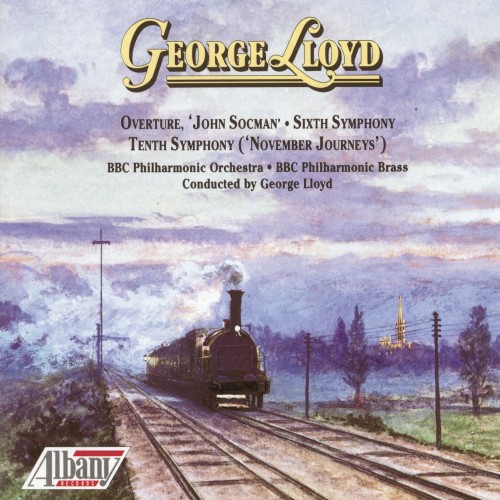Lloyd: Symphony 4 & Socman Overture
With George Lloyd's Symphony no. 4, subtitled 'The Arctic', we come across his first symphony with any recorded competition.
I am following Lloyd's symphonies as conducted by the composer, but his middle symphonies were also championed by Sir Edward Downes, and can be found on Lyrita from the 80s.
Apparently, Downes and Lloyd were on friendly terms, most likely due to the former advocating for the composer, but something eventually came between them.
Timing wise, Downes is a tick faster than Lloyd's own recording, but in a symphony lasting just over an hour, any differences are small change. I have never felt short-changed on any of George Lloyd's leading of his works, as the composer acquits quite beautifully across his own recordings, but some might prefer a seasoned professional's take on another's music.
The symphony itself is monumental in comparison with what came before it. Each movement runs somewhere between 12 to 20 minutes, and finds Lloyd at his most atmospheric. There is definitely a musical description of some kind going on here, be it landscape or not. The subtitle naturally lends the listener to frosty climes alongside the perseverance of life, something akin to Vaughan Williams' Symphony no. 7 'Sinfonia Antartica'.
Of course, Vaughan Williams' creation was based on the dashing tale of Captain's Scott's tragic journey. In the case of Lloyd's Symphony no. 4, the end product is more of a cathartic journey for the composer, as he actually served in the Arctic during WWII. Instead of a wartime symphony however, comes a work created as a method of healing. In the end, Lloyd's music is revealed not as a crime of humanity in the face of war, but the positive power of the musical spirit. In an age of cynicism, George Lloyd's optimistic viewpoint is refreshing, especially for a mid-20th-Century creation.
The musical ideas throughout the symphony are epic in scale, but more importantly, Lloyd takes his time unraveling its paths. The opening is akin to working through a storm, while the second movement is a gentle, colorful kaleidoscope of orchestral colors.
The third movement is a genial, happy setting, with trills of the natural world warbling out in its more thoughtful middle section. A lovely solo-string coda of great warmth settles in before the penultimate movement's triumphant finish featuring a melody of great memorability.
The finale is the work's longest movement, but instead of assaulting the listener with fanfares and revelry, Lloyd opens with a heartfelt horn solo over trembling strings. It doesn't take too long, though, for the brass-fed musical celebrations to begin, even if they are muted at first. Eventually, brass and wind solos pick up a catchy tune, and the whole affair is sent off on a rather operatically positive note, with some swarthy-sounding trombones and piping winds at the fore during the symphonic musical struggle.
On the Lyrita set released in 2024, Symphony no. 4 is paired with the Overture from John Socman, an opera penned by George Lloyd.
It is a perky, swirling Scherzo of continued high spirits. Best of all, it showcases the abilities of an orchestra in a short span of time, in this case, the BBC Philharmonic.
At only five minutes, this overture hardly stands up to the lengthy symphony it is paired with, yet it fills out the disc nicely.
I love the Albany Symphony Orchestra; they do such wonderful work! There were moments in this recording of the symphony where I could detect seams in the string playing, although nothing was worth writing home about, yet noticeable in one or two places. On the other hand, the timpani thwacks were superb!
Listen on YouTube
Works
Symphony 4 'The Arctic' (64.58)
John Socman: Overture (5.27)
Performers
Albany Symphony Orchestra
BBC Philharmonic Orchestra
George Lloyd, conductor
Label: Albany
Year: 1988-89
Find more Lloyd recordings HERE!





Comments
Post a Comment